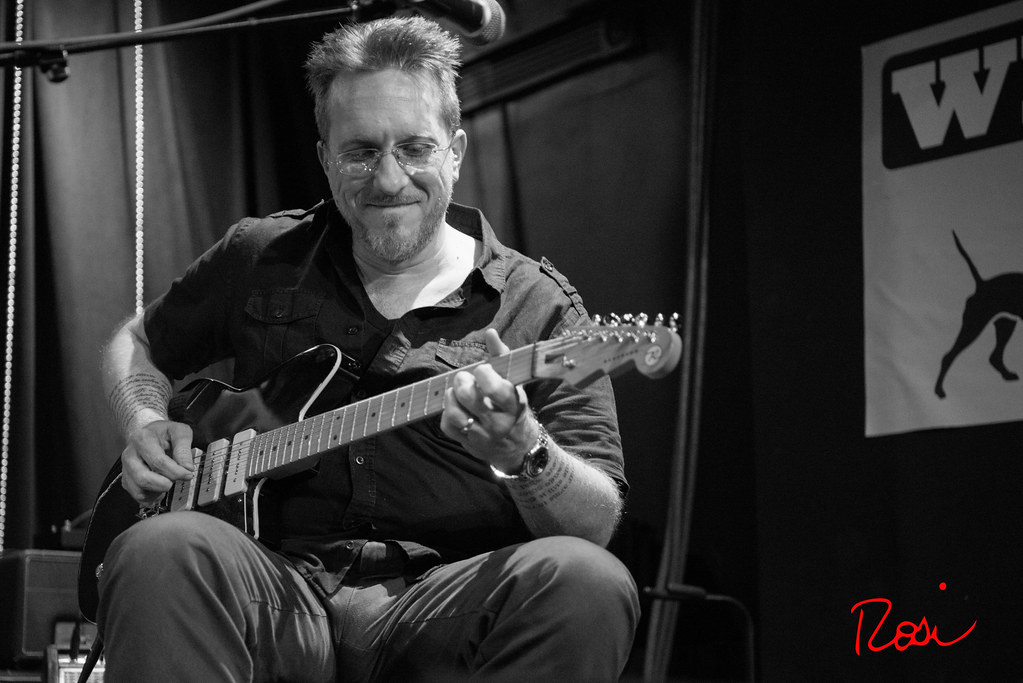
Feature image credit: Rosi Photography
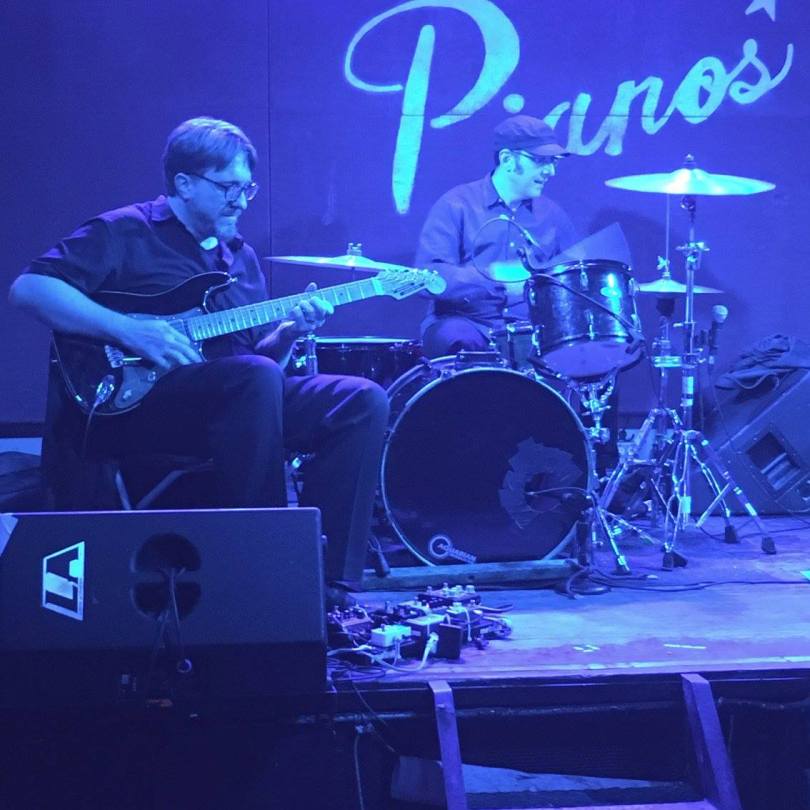
The five-piece instrumental band, The Royal Arctic Institute, has been making waves in the instrumental sector for the past few years, and they’re ready to share their latest effort titled From Catnap to Coma on February 4th, 2022!
Head over to wherever you get your music and familiarize yourself with their dreamy, and hypnotic soundscapes to get yourself ready for what’s to come. Today, we’re speaking with guitarist John Leon, where you’ll learn about him, his band’s origins, and everything in between!
If you’d like to learn more about The Royal Arctic Institute, you can head over to the group’s website, and dig in.
Anthony:
John, thank you so much for taking the time to do this with us today! How’ve you been holding up these past couple of years?
John:
Thanks so much for having me! The past couple of years have been indescribable. The whole world changed, and I think we are all reeling. What better time to make some art?
Anthony:
It looks like you’ve been busy getting ready for the release of your new From Catnap To Coma. Can you talk about your new music, and what we can expect? What kind of story would you say it tells?
John:
This record really does reflect a solidification of the band as a five-piece. Our last record, Sodium Light, was this same current five-piece lineup, but we were still getting used to playing together. Don’t get me wrong, I’m very proud of that record, but From Catnap To Coma feels a bit more cohesive to me. As far as the story it tells, well, I have been telling people that I would like listeners to feel as if they are underwater in slow motion. Or being sucked down into a pool of molasses. My hope is that listening to it feels like a beautiful fever dream!
Anthony:
From Catnap To Coma is your second project with the current lineup, correct? Was it a seamless transition from your previous incarnation into this one?
John:
Yes, our last record Sodium Light was this lineup as well, but on that record, our other guitarist, Lynn Wright, was not yet a full-time member of the band. We went in and recorded those tunes as a four-piece (guitar, bass, drums, and keyboard), and then I invited Lynn to come in, and do some extra guitar parts. Lynn and I have known one another since the early 90s, and having him play on that record ended up being great. So, after that, he ended up playing with us full-time, rounding the group into a five-piece. From Catnap To Coma is a real band effort/collaboration between all five of us. It’s been really wonderful to develop the material in this way.
Anthony:
Let’s go over the current iteration of the band. Who’s who, where are you guys from, and how did you get the five of you together?
John:
Sure thing! So, the band consists of me (guitar), Lynn Wright (guitar), Carl Baggaley (keyboards), David Motamed (bass), and Lyle Hysen (drums). For the sake of history, here is a little backstory — Lyle and Dave have played together since the early 80s in bands like The Misguided, Das Damen, and Arthur Lee’s backing band. They are very close friends. So, there is that part of the history. Then there is me and Lynn Wright. We have known one another since the early 90s from playing in bands that ended up sharing the same bill down on the Gulf Coast. Okay, so that’s the history part.
Lyle and I started The Royal Arctic Institute back in 2016 with our original bassist Gerard Smith. That lineup recorded two full-length records, with the great producer/engineer Tom Beaujour at the helm. We ended up putting the second one out on Rhyme and Reason Records. That went on for a few years and it finally sort of fizzled out. We disbanded around the end of 2019.
Around that time, Das Damen reunited to record a song for a Flamin’ Groovies tribute record. That was the first time that Lyle and Dave had played together in about twenty years. It occurred to them that they really missed playing together, so Lyle proposed that we get together, and try it out. And it just worked. Magically. Probably because the two of them have been musical partners for so long. We decided to give it a go, but we wanted to round out the sound and take it from a trio to something else.
I had seen Carl Baggaley playing keys with the supergroup, Gramercy Arms. And I thought, “Damn, that guy is great!” Then, one night, I ended up jamming with them at a rehearsal studio in Manhattan, and I really loved playing with him. So, I called up Dave Derby (Gramercy Arms) and asked for Carl’s number. I invited him to come and play with us, and it was great! So, all of a sudden we were a four-piece.
During the first few months of the pandemic, the four of us hunkered down in our studio, masked, and started working on material. Having that to look forward to every week really kept the four of us sane during that time. That was when we wrote all of the material that ended up on Sodium Light. Around September of 2020, we went into Kaleidoscope Studios and did those five songs with Tom Beaujour producing/engineering. I had played on and off with Lynn Wright over the years. He and I worked really well together, and I heard him in my head playing on those batch of songs. We invited him in to play on the record, and it ended up being really magical. So, after that, the five of us started playing and writing together regularly, and boom! The five-piece was born! We then started writing all of the material on From Catnap To Coma.
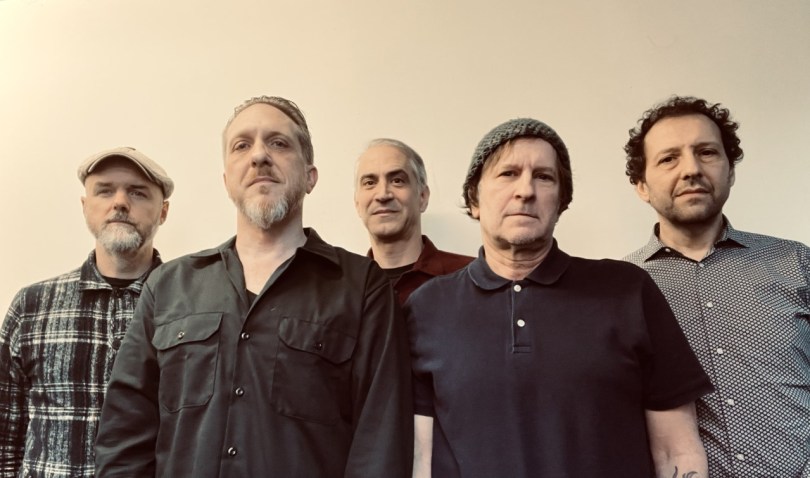
Anthony:
What’s your musical background? You’re the guitarist and songwriter for the band, what got you started in songwriting and playing guitar?
John:
I grew up on the Alabama Gulf Coast. I come from a musical family (third generation!) and music has been a part of my life since a very early age. My parents had the 45 for Jerry Reed’s “East Bound And Down” from the Smokey And The Bandits Soundtrack. They tell me that they would play it and that I would run in circles around the coffee table for the entirety of the song! Anyway, my father constantly played Sgt. Pepper on the stereo and that got ingrained in my DNA. I started playing guitar when I was eight. MTV had just started and I wanted to be THAT! So, my parents got me a guitar teacher, and I started learning. Around the time I was twelve, a kid in my neighborhood showed me that we had a college radio station, and that was the trap door that I fell through! Punk Rock, 80s New Wave, all that stuff. I got completely consumed with it. I started playing in bands at thirteen, and I just never quit!
Anthony:
Are you mostly self-taught or did the lessons have a great effect on you?
John:
I took lessons with a lot of different teachers over the years. I didn’t do any formal training at a school or anything like that. But I was very fortunate to have some great, and I mean GREAT, teachers over the years. When I was in my early teens, I had a guitar teacher named Steve Harper. He taught me how to sit down with a song and teach myself how to play it. He taught me how to listen and find chords on the guitar neck, etc. He taught me a bunch of East Bay Ray parts from all of those great Dead Kennedys records. I learned a bunch of Poison Ivy guitar parts from The Cramps records. He taught me how to teach myself. And that was really powerful. A few years ago, I took some lessons from Steve Ulrich of the great New York instrumental trio Big Lazy. That was great. He’s a fantastic teacher. I think it’s quite important to continue working on craft no matter how long I have been playing.
Anthony:
As a studio, backing, and touring musician, can you go over some of the other artists you’ve worked with before The Royal Arctic Institue?
John:
Sure thing. I did most of my work in Austin, TX. I lived there for a long time before relocating to New York. In Austin, you can’t throw a rock without hitting a great guitarist. So, about twenty years ago, I took up pedal steel. I had always been fascinated by the instrument, and I finally took the plunge. That opened a ton of doors for me in getting work. I played with a bunch of Texas singer-songwriters. People like Robert LaRoche, Kevin Higgins, Abra Moore (Poi Dog Pondering), Kelly Willis, Trish Murphy, etc. I played a lot of Country gigs. But I played on a bunch of records and did some soundtrack work and music for commercials. Then around 2007, my band The Summer Wardrobe got hired to be Roky Erickson’s backing band. That was a TRIP. It was a big part of my education. We only played with him for about a year, but the shows I played with him were wonderful experiences. That was a big part of my education.
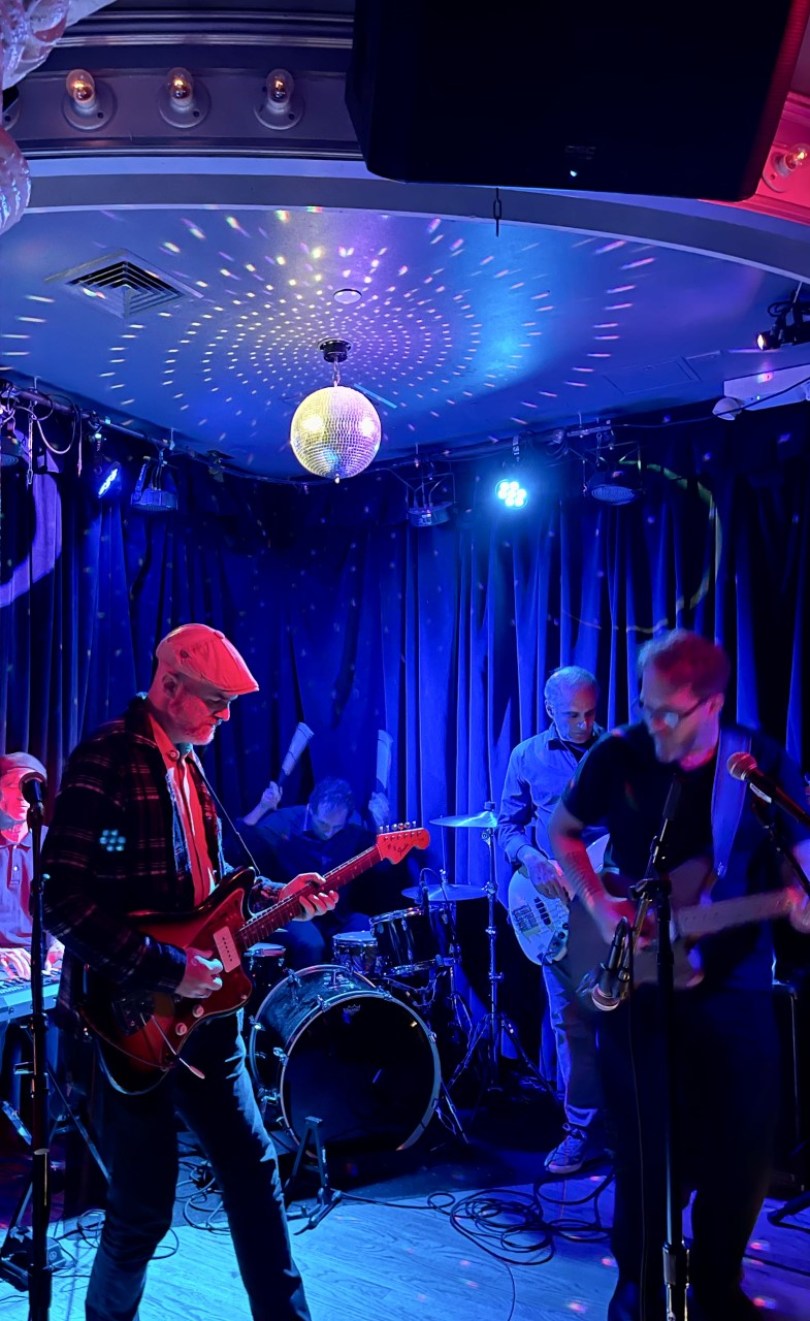
Anthony:
Listening through some of your music from Accidental Achievement to your latest EP Sodium Light, there’s a real sense of melancholy, and calmness with the bright, warm guitar tones mixed with some Jazz fusion, Rock and Blues. What’s the inspiration behind your music?
John:
I think that it’s a culmination of EVERYTHING. I love all types of music and I’m like a sponge! Instrumental music has always attracted me. Some of my favorite guitarists do a lot of Instrumental music. Bill Frisell comes to mind. I love that stuff. As far as the melancholy part goes, for some reason that I can’t really explain, I have always loved sad music! I’m not sure why. But it appeals to me. I hope that translates.
Anthony:
What is your process for composing new music when it comes to playing instrumentals? Do you guys get together, jam, and see what comes up? Or is there a more intricate process behind it all?
John:
I have historically come up with material from just sitting down, and playing guitar. I record demos in my home studio that I send out to the band. Then we completely deconstruct the pieces together. Everyone writes their own parts. Everyone participates in the arrangement. We are very much a band in that sense. It is a very collaborative effort. Lately, everyone has started bringing their own musical themes to the table for us to develop. That’s been great. It ends up being a very fun process. I love writing a piece, bringing it to the band, and then having it develop/morph into something that sounds unlike the original piece. I love the collaboration and watching the pieces become their own thing.
Anthony:
What equipment do you work with to record? Does it differ from what you play with live?
John:
It’s been everything but the kitchen sink! When we recorded with Tom Beaujour, we used a bunch of different amps. We recorded isolated so that there was a lot of room for overdubs and such. All of that was recorded to Pro Tools. When we recorded with James McNew, it was a different process. We were all set up in the same room, and it was essentially recorded live to Pro Tools. Lynn and I recorded using two small guitar amps (a Fender Blues Jr. and a Boss Katana 50). I think on both records Dave played through a big Ampeg bass amp, and Carl went direct.
When we play live, we typically use whatever is there! Moving guitar amps around New York City ends up being a real pain, so backline amps are always great. Even if they aren’t as nice as the amps I own. I don’t care so long as I don’t have to carry it!
Anthony:
Where have been some of your favorite places that your music has taken you?
John:
I love playing in Europe. Germany is pretty great. There are a lot of avid American music fans there. But I think that the most exciting thing that I have ever been able to do musically was playing on the Austin City Limits television show with Roky Erickson. That was an amazing experience. The guest guitarist was Billy Gibbons. It was like a mob scene. The whole time we were recording the show I was thinking, “Oh my god. I’m on Austin City Limits. I used to watch this show with my dad when I was a kid!” And then I would think, “And I’m playing with Billy Gibbons! And he’s being really nice to me!” That night was a real highlight of my career. It was magical, and I am so thankful that I got to do it.
Anthony:
What are some of your other passions outside of music?
John:
I am an avid reader. That has always been my favorite form of escape. I love coming home and curling up in my recliner with my cats, and a book. Literature plays a big role in music for me. I am also a big walker. I live about twenty miles upriver from Manhattan in the Lower Hudson Valley. I have this walking path that hugs the Hudson River. It ends up being a few miles, and I love that. And then, I also get a lot of joy, and love from my three cats. They are a big source of joy.
Anthony:
Who are some of your favorite musicians and albums that you can recommend to us?
John:
Oh wow, where to start?!? There are so many! For Instrumental music, I love all the Boogie-Woogie Instrumental guitar records from the 50s. That first Freddie King record is great. Buddy Emmons made some fantastic Instrumental pedal steel records. I listen to everything.
BUT! One of the most important records for me is Mercury by The American Music Club. It’s not an Instrumental record, but the music on it, the instrumentation, and the sounds on it have been a real north star for me.
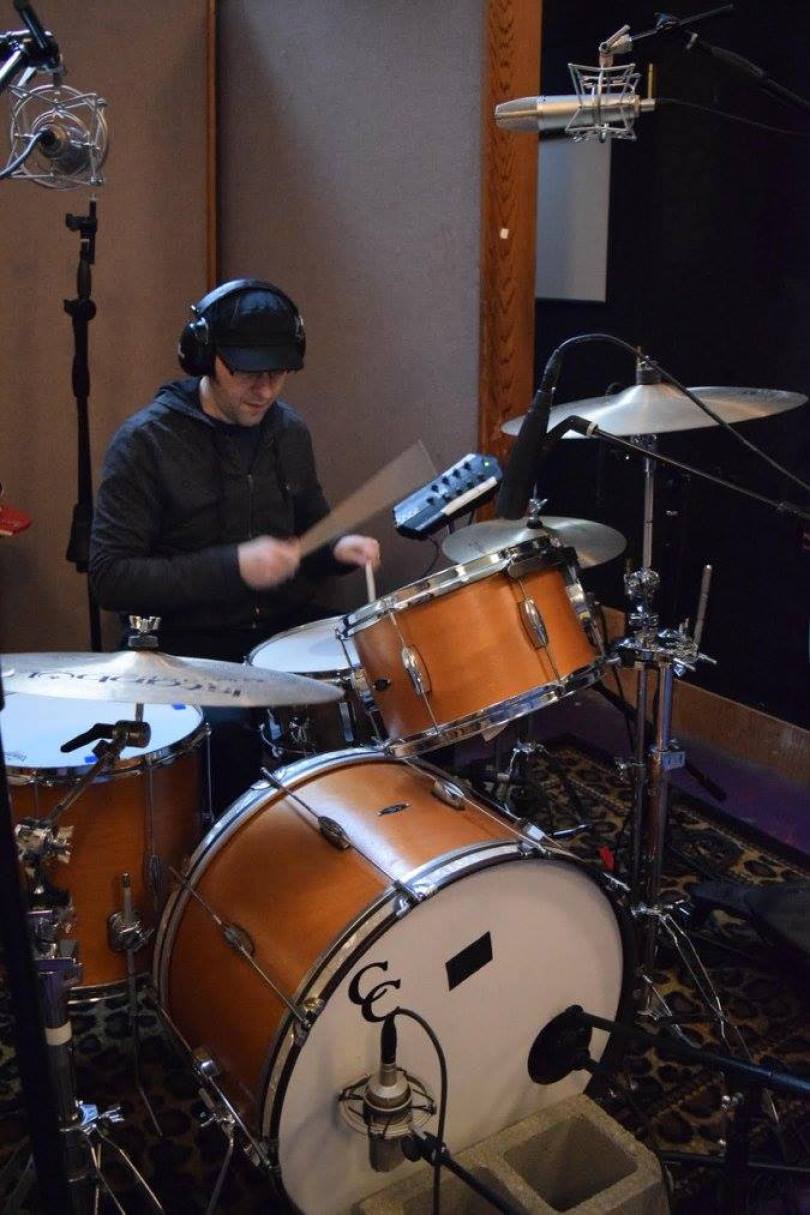
Anthony:
John, thanks again for doing this with us. What does the future look like for yourself and The Royal Arctic Institute?
John:
Thanks so much for asking me to do this! From Catnap To Coma is being released on Already Dead Tapes and Records on February 4th. We are playing our record release on February 5th at Berlin Under Ave A with Sleepyhead. After that, we are playing a string of out-of-town gigs in the North East. Boston, Providence, Portsmouth, Portland, DC. Then, after that, we head back to writing. We are working on a new batch of material, and hopefully, we can get back in the studio by the end of this year. We just want to keep playing as much as we can.
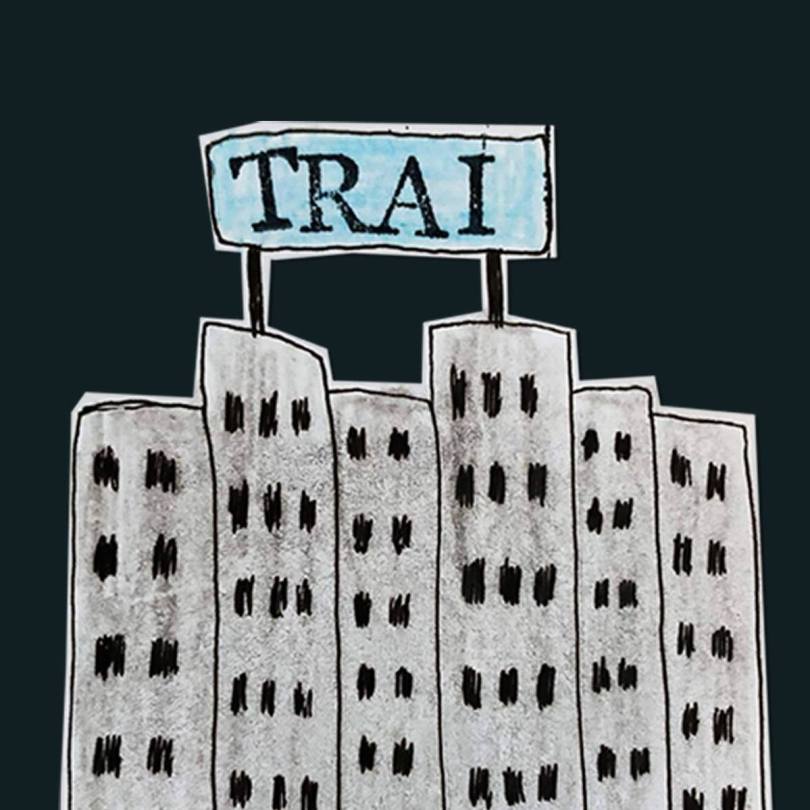
Interested in learning more about The Royal Arctic Institute? Check out the links below:
Dig this? Check out the full archives of A.M. Radio, by Anthony Montalbano, here: https://vwmusicrocks.com/a-m-radio-archives/
